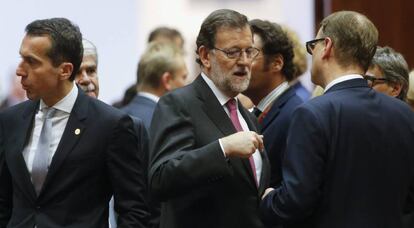Rajoy banking on a Socialist abstention to become Spain’s next PM
Resigned to a minority mandate, PP chief pressures main opposition group into avoiding a third national election


Three days after Spain held a repeat national election, negotiations to form a new government have yet to start.
There is talk in political circles that acting Prime Minister Mariano Rajoy, who reinforced his December victory with an even bigger lead over his rivals this past Sunday, may delay these negotiations until next week.
In a complicated scenario where the winning Popular Party (PP) still lacks a parliamentary majority, having secured 137 seats in the 350-deputy chamber, not even party leaders are certain of what will happen in the coming weeks.
Very few alternatives
Even if the PP managed to secure additional support from smaller groups such as the Basque Nationalist Party (PNV) – mirroring a governing deal that took place in 1996 – the sum of PP, Ciudadanos and PNV would still fall two seats short of 176, requiring somebody else’s abstention in the second round of the investiture vote.
And this time around, bad relations between Rajoy and Basque premier Iñigo Urkullu make such a deal unlikely. PNV president Andoni Ortuzar has announced his willingness to talk to the PP; bu warned that he sees an agreement with Rajoy as “very, very, very difficult.”
As for other congressional groups, Rajoy neither hopes nor desires any help from the Unidos Podemos leftist alliance, which he has repeatedly described as radical and extreme. And his soured relations with Catalan nationalists rule out any help from groups such as Convergència or Catalan Republican Left (ERC).
But Rajoy’s inner circle has already extracted a few conclusions from the candidate’s own statements following Sunday’s victory.
“Rajoy is now willing to lead a minority government if he fails to secure support for a grand coalition with the Socialist Party (PSOE), unlike what happened after December 20, because now there is no other alternative,” said one of the acting prime minister’s closest aides.
Privately, Rajoy is apparently conveying the sense that he believes the Socialists will abstain at the congressional vote to name the next prime minister, thereby offering passive support.
But his first choice would be a coalition with the Socialists, who earned 85 seats at the election, managing to hold on to second spot despite all the surveys that predicted they would get bumped down by the leftist Unidos Podemos alliance.
This in itself would be a historical first, as the PP and PSOE have been rivals throughout Spain’s democratic history. But so far, the Socialists have underscored their unwillingness to enter such a deal, citing the PP’s long corruption record.
Plan B
The second option would involve Rajoy officially standing for prime minister at an investiture vote in Congress, getting voted down by the PSOE in the first round, then securing a Socialist abstention in the run-off, thereby allowing the conservative candidate to take office.
For now, the only thing Rajoy has revealed is that he plans to call Socialist nominee Pedro Sánchez first, to get a sense of his intentions for the coming weeks.
Sign up for our newsletter
EL PAÍS English Edition has launched a weekly newsletter. Sign up today to receive a selection of our best stories in your inbox every Saturday morning. For full details about how to subscribe, click here.
As for the small upstart party Ciudadanos, which has repeatedly attempted to bridge the gap between the conservatives and the Socialists with cross-party proposals, its poor results on Sunday (32 seats, down from 40 in December) mean that its support is not enough for a PP government.
Before walking into a European summit on Brexit held in Brussels on Tuesday, Rajoy asked for some calm, and reiterated his right to lead Spain’s new government. He also warned against the “absurdity” of heading for third elections because of “someone’s close-mindedness,” alluding to the Socialists’ unwillingness to lend their support to a Rajoy-led administration.
Rajoy added that he hopes others “will at least let the winner govern, even if he has to do so in a difficult situation.”
English version by Susana Urra.
Tu suscripción se está usando en otro dispositivo
¿Quieres añadir otro usuario a tu suscripción?
Si continúas leyendo en este dispositivo, no se podrá leer en el otro.
FlechaTu suscripción se está usando en otro dispositivo y solo puedes acceder a EL PAÍS desde un dispositivo a la vez.
Si quieres compartir tu cuenta, cambia tu suscripción a la modalidad Premium, así podrás añadir otro usuario. Cada uno accederá con su propia cuenta de email, lo que os permitirá personalizar vuestra experiencia en EL PAÍS.
¿Tienes una suscripción de empresa? Accede aquí para contratar más cuentas.
En el caso de no saber quién está usando tu cuenta, te recomendamos cambiar tu contraseña aquí.
Si decides continuar compartiendo tu cuenta, este mensaje se mostrará en tu dispositivo y en el de la otra persona que está usando tu cuenta de forma indefinida, afectando a tu experiencia de lectura. Puedes consultar aquí los términos y condiciones de la suscripción digital.








































